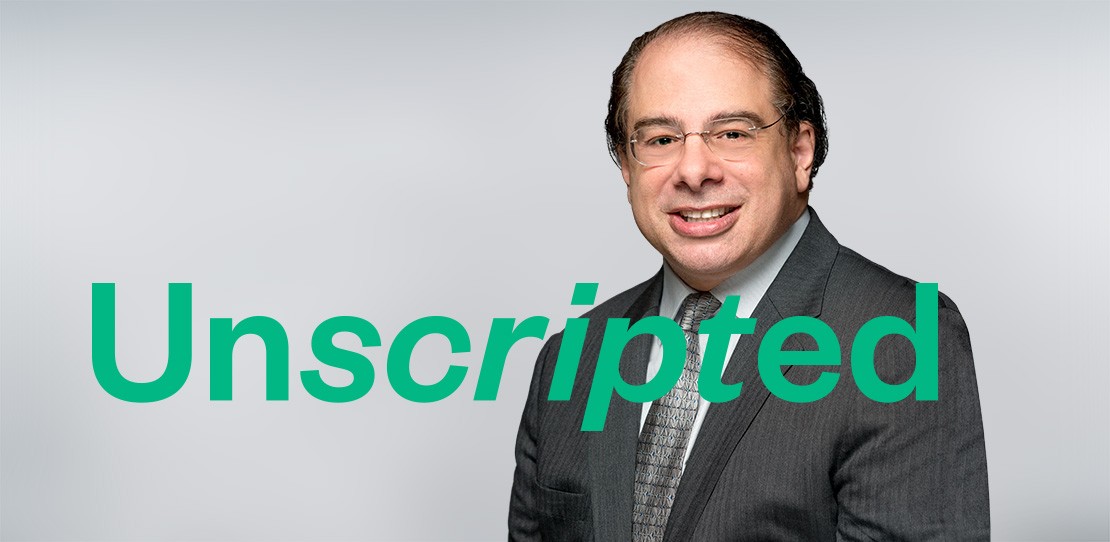
The Future of AI/ML—Taking a Human-Centric Approach to Innovation
As AI/ML advances, developers have the responsibility and opportunity to ensure machine-made decisions are human led.

For many of us, our notions of artificial intelligence were formed years ago in science fiction movies where robots take over the earth. Real-world advances in AI today unleash capabilities we’re only beginning to fathom. With those capabilities come tremendous responsibilities. Dive in with an internationally recognized expert in AI as he answers thought-provoking questions and offers his unique perspective on hope for the future.
Be very careful. It's not your data that's going to get you in trouble. It's what you believe that's going to get you in trouble.
–Anthony Scriffignano
So my name is Anthony Scriffignano. I am the chief data scientist at Dun & Bradstreet.
Some Asian languages (Chinese, Japanese), Spanish, Italian, English, French, modern Greek.
I'm very interested in martial arts, particularly kung fu and aikido. I'm very interested in ballroom dancing. Used to be on a tango team, fun fact.
A long time ago, I was a budding professional magician.
I think most people form their opinions about artificial intelligence from science fiction and books and movies. And honestly, some of that's valid. Some of what you see in books and movies either comes to be in the real world, because it was inspired by that, or it was actually reflective of what we can do. Unfortunately, a lot of it is also fantasy at this point.
So what we have to remember is, there's no intelligence in artificial intelligence. It's a bunch of math. You're looking at a bunch of data. You are informed by a belief system or two or three, and then you use that belief system and those methods that apply and that data and that math to reach a conclusion. There's no thinking involved here. We've got to stop using these human terms like "learning" and "intelligence." We've got to come up with some new words to make this more clear.
It will if we let it. So AI is not going to take over the earth, but AI might become our overlords in many respects. I say that I'll never report to a robot, and then Outlook tells me to go to a meeting, and I go to the meeting. So we are already at some level taking direction from guidance systems, from meeting planning software, from recommendation engines, all the time. How much of our volition, how much of what we do as human beings, are we willing to give up to a machine? And in some cases, should we be giving more up to a machine, because it could actually make a better decision or a faster decision? This is a very fine balance that we're navigating right now, and it won't go away. It'll probably get more complicated as things evolve.
So my humble opinion—the only way we're going to get better at serving ourselves with these methods is to use lots of them in combination. Unfortunately, that's a lot harder to do. And most of the purveyors of artificial intelligence want to convince you that their one method is the "one ring to rule them all." Just put all your data here, push this button, and you'll get the answer. You might get the answer if it's a trivial question, but other than that, I think you're going to have to get a bigger boat in the future.
So if you start using supervised methods, which use longitudinal data, data from the past, to predict the future, and you say it's 95 percent accurate that measurement of 95 percent accurate was with respect to the past, not with respect to the future. Be very careful. It's not your data that's going to get you in trouble. It's what you believe that's going to get you in trouble.
So what gives me hope for the future is that we keep asking that question. It's so important that we don't get so wrapped up in what we can do that we lose sight of the reality of what we can't yet do. There's a lot of opportunity in front of us. There's also a lot of ominous risk in front of us. And we need to be very humble about where we are and what's possible and not get so happy and convinced that we've got all this capability that we just try to use it all.
Engineers can't be engineers and also become experts in AI and computer science methods. And the AI people can't just come in and somehow bring the wisdom without a knowledge of first principles of engineering and design and evolution of customer service and so forth. So we have to become much better at collaborating with each other, not only because of hyper-disruption but because of the federation of capabilities. Where everything is becoming available to everyone, that doesn't mean they know how to use it. So we need to work with each other more.
We need to be much more reflective. If we're going to survive in this disruptive future, we've got to be a lot more reflective and a lot more humble about what's possible and a lot more cognizant about what we have yet to do.
NI: Where did you grow up?
Anthony: I grew up in New Jersey. It would be hard for you to throw a dart on a map and hit some place in the world where I haven't worked, yet I've always lived within two square miles!
NI: Please expand on a fun, little known fact about you?
Anthony: Here’s a little known fact. In a former life, a long time ago, I was a budding professional magician. I like to do sleight of hand, and I still practice a lot of that. Strangely enough, a lot of the principles that you use in magic—misdirection and pattern and timing—are very appropriate when you're doing public speaking and when you're talking to large groups. You learn a lot that you can use in other ways.
NI: What aspect of yourself would you consider a work in progress?
Anthony: [laughs] I would consider every aspect of me a work in progress. I have volunteered for many years, decades, as an EMT (emergency medical technician). I'm still certified. What do you do to help people now? It's very different than what you did to help them three months ago. Physically, spiritually, epistemologically, intellectually, we are all a work in progress. We're all a canvas that we're painting on for our whole lives. I think that you should try to teach something and learn something every day. If you're only teaching, you're probably becoming slowly irrelevant. If you're only learning, you might be a little bit selfish. You've got to find a balance.
NI: What is one of the most controversial opinions that you hold as a data scientist around artificial intelligence?
Anthony: One of the more controversial opinions that I hold with respect to artificial intelligence is that it's neither artificial nor intelligent. It's absolutely designed for a purpose. These methods are documented. Very often, a lot of the methods that we think are new today, they've been around for decades. We just suddenly have the power for it.
NI: Where do you find inspiration?
Anthony: [smiles] Apart from having conversations like this? I find inspiration from everywhere. I'm generally a very optimistic person. I'm not going to say I don't have my down days. We all have that. But I try to see the positive in things that are happening, and I try to look for how I can change what's happening now to make it slightly more in the direction of where things need to be going.
What gives me hope is that other people think that way—that you can find some ground in between. We are much less focused now on “I win, you lose” and much more focused on how we can serve some customer or some other person better together than we could separately. I think that is really where it's at right now. There's no credible argument that organizations of any size can be successful in the future without collaboration, and that's what we're all about right now.
Anthony J. Scriffignano, PhD, is the senior vice president, chief data scientist with Dun & Bradstreet. He’s an internationally recognized data scientist with over 35 years in multiple industries and enterprise domains. He was recognized as the U.S. Chief Data Officer of the Year 2018 by the CDO Club, the world's largest community of C-suite digital and data leaders. He has an extensive background in manufacturing and supply chain, maintaining certification as CPIM with ASCM, the largest, internationally recognized non-profit organization for supply chain/manufacturing training and accreditation.
Scriffignano serves on various advisory committees in government, the private sector, and academia. He recently provided insight on data science implications in the context of a highly disrupted datasphere in relation to a global pandemic. He’s considered an expert on emerging trends in advanced analytics, the “Big Data” explosion, artificial intelligence, multilingual challenges in business identity, and malfeasance in commercial and public-sector contexts.